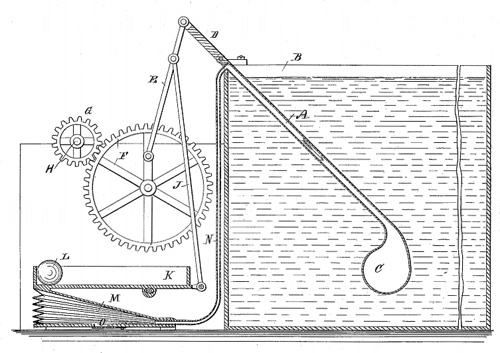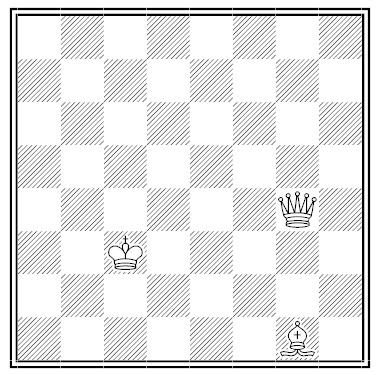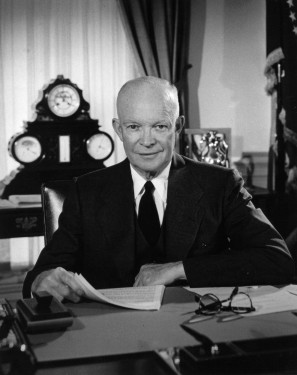“We may see the small value God has for riches by the people he gives them to.” — Alexander Pope
Post Production
In 1929, aspiring actor Charles Loeb had a friend pack him into a box labeled “Statue–Handle With Care” and ship him from Chicago to the Pathé motion picture studios in Culver City, Calif.
He arrived four days later, nearly dead, but told police he was pleased he’d finally made it through the gates of a major studio.
See Special Delivery.
A Valuable Oversight

Patent examiners are busy people, and when this application arrived at the U.S. Patent Office in 1881 it seemed innocuous enough — the inventor, John Sutliff, had called it simply “motor.” So they issued the patent.
It is, in fact, a perpetual motion machine. When ball L rolls to the left, it depresses the bellows, which fills the submerged bulb, raising the lever and turning cogwheel F. This pivots the box, which sends the ball back to the right, drawing air into the bellows and submerging the bulb again, “and so on alternately.”
Thus the cogwheel turns forever, driving shaft H, which you can hook up to anything you like. A convenient source of endless free energy, and it’s been under our noses all this time.
Alphabet Soup
A story has been told of a graceless scamp who gained access to the Clarendon printing-office in Oxford, when the forms of a new edition of the Episcopal prayer book had just been made up and were ready for the press. In that part of the ‘form’ containing the marriage service, he substituted the letter k for the letter v in the word live, and thus the vow to ‘love, honor, comfort,’ etc., ‘so long as ye both shall live,’ was made to read, ‘so long as ye both shall like.’ The change was not discovered until the whole of the edition was printed off.
— Ballou’s Monthly Magazine, October 1870
When Teddy Roosevelt was sworn in in 1901, the New York Times printed a B in place of an O in one story and recorded that “surrounded only by a few friends, Theodore Roosevelt took his simple bath to defend and carry out our Constitution.”
“The most amusing feature of the above,” reported the Bookman, “is due to an English newspaper which quoted the paragraph, did not recognise the misprint and went on to comment upon it with perfect seriousness.”
A Rather Long Resume
In 1867, the finance department of the city of Madrid employed a man named Don Juan Nepomuceno de Burionagonatotorecagageazcoecha.
If he had moved to northern Bohemia and become “deputy-president of the Food-Rationing-Winding-Up-Commission,” his job title would have been Lebensmittelzuschlusseinstellungskomissionsvorsitzenderstellvertreter.
In a perfect world he would then moonlight as a Gesundheitswiederherstellungsmittelzusammenmischungsverhältniskundiger, Bismarck’s term for an apothecary.
In his library he would keep the Antipericatametanaparbeugedamphicribrationes Toordicantium, mentioned by Rabelais in Gargantua and Pantagruel, and Thomas Love Peacock’s Headlong Hall, in which the phrenologist Mr. Cranium describes anatomical structures as osseocarnisanguineoviscericartilaginonervomedullary and osteosarchaematosplanchnochondroneuromuelous.
And he would vacation in Bristol, whose spa waters were described by the English medical writer Edward Strother (1675-1737) as aequeosalinocalcalinoceraceoaluminosocupreovitriolic.
Or perhaps he should just stay in Madrid.
“Four Puzzles in One”

By Sam Loyd. Place the black king (a) where it can be checkmated on the move, (b) where it’s in stalemate, (c) where it’s in checkmate, and (d) where the three white pieces can’t be arranged to checkmate it.
Top Billing
Sam Goldwyn entered show business as Sam Goldfish.
In 1916 he formed a production company with Edgar Selwyn, and the two combined their names to form Gold-Wyn Pictures.
Critics pointed out that the alternative would have been “Selfish Pictures.”
All Clouds, No Thunder

Dwight Eisenhower’s elliptical speaking style exasperated the Washington press corps. Journalist Oliver Jensen rewrote the Gettysburg Address as Ike would have delivered it:
I haven’t checked these figures, but 87 years ago, I think it was, a number of individuals organized a governmental setup here in this country, I believe it covered certain eastern areas, with this idea they were following up based on a sort of national independence arrangement and the program that every individual is just as good as every other individual. Well, now, of course, we are dealing with this big difference of opinion, civil disturbance you might say, although I don’t like to appear to take sides or name any individuals, and the point is naturally to check up, by actual experience in the field, to see whether any governmental setup with a basis like the one I was mentioning has any validity and find out whether that dedication by those early individuals will pay off in lasting values and things of that kind. …
Now frankly, our job, the living individuals’s job here, is to pick up the burden and sink the putt they made these big efforts here for. It is our job to get on with the assignment–and from these deceased fine individuals to take extra inspiration, you could call it, for the same theories about the setup for which they made such a big contribution. We have to make up our minds right here and now, as I see it, that they didn’t put out all that blood, perspiration and–well–that they didn’t just make a dry run here, and that all of us here, under God, that is, the God of our choice, shall beef up this idea about freedom and liberty and those kind of arrangements, and that government of all individuals, by all individuals and for the individuals, shall not pass out of the world-picture.
Junk Food
When Ida, the famous ostrich at the London Zoological Gardens, died in 1927, a post-mortem showed that she’d eaten too many foreign objects offered by visitors. Her stomach contained:
- three handkerchiefs
- three gloves
- three feet of cord
- an empty film spool
- a four-inch nail
- an eight-inch nail
- a four-inch lead pencil
- four half-pennies
- two farthings
- a French coin
- part of a celluloid comb
- part of a rolled-gold necklace
- a collar button
- a bicycle tire valve
- a brass winding key for an alarm clock
- a dozen short bits of wire
- metal staples
- screws
- small nails
- copper rivets
- a glove fastener
- a piece of wood four inches long
“It seems to us that the Associated Press is very profligate with its cable tolls these days,” observed one New York newspaper that picked up the story. “Why didn’t the correspondent say the ostrich had swallowed a stray Ford and be done with it?”
“Literal Obedience”
“Oh, slip on something and come down quick!”
His wife exclaimed with a frightened air.
He did: and he feels he has been played a trick–
For he slipped on a rug at the top of the stair.
— Bert Leston Taylor, collected in A Book of American Humorous Verse, 1917
